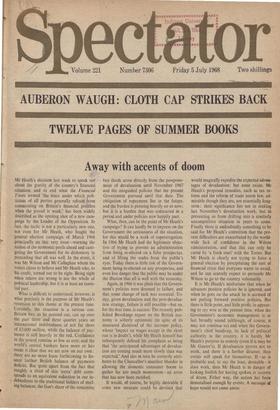Away with accents of doom
Mr Heath's decision last week to speak out about the gravity of the country's financial situation, and to end what the Financial Times termed 'the truce under which poli- ticians of all parties generally refrain from commenting on Britain's financial position when the pound is weak,' has been widely described as the opening shot of a new cam- paign by the Leader of the Opposition. In fact, the tactic is not a particularly new one, not even for Mr. Heath, who fought the general election campaign of March 1966 principally on this very issue—warning the nation of the economic perils ahead and casti- gating the Government for its dishonesty in Pretending that all was well. In the event, it was Mr Wilson and Mr Callaghan whom the voters chose to believe and Mr Heath who, to his credit, turned out to be right. Being right when others are wrong is not the whole of political leadership, but it is at least an essen- tial part. two thirds arose directly from the postpone- ment of devaluation until November 1967 and the misguided policies that the present Government pursued until that date. The obligation of repayment lies in the future, and the burden is pressing heavily on us now; but it is a burden that was contracted in a period and under policies now happily past.
What, then, can be the point of Mr Heath's campaign? It can hardly be to impress on the Government the seriousness of the situation, for this would be a work of supererogation. In 1966 Mr Heath had the legitimate objec- tive of trying to prevent an administration from being re-elected on a false prospectus, and of lifting the scales from the public's eyes. Today there is little risk of the Govern- ment being re-elected on any prospectus, and even less danger that the public may be under the illusion that all is well with the economy.
Again, in 1966 it was plain that the Govern- ment's policies were doomed to failure, and that some change of tack was essential. To- day, given devaluation and the post-devalua- tion strategy, failure is still possible—but so, for the first time, is success. The recently pub- lished Brookings report on the British eco- nomy is soberly optimistic (in spite of its measured dismissal of the incomes policy, whose 'impact on wages except in the short run is in doubt'), while Mr Heath himself has subsequently defined his complaint as being that 'the anticipated advantages of devalua- tion are coming much more slowly than was expected.' And this in turn he correctly attri- butes to the Chancellor's manifest blunder in allowing the domestic consumer boom to gather far too much momentum—an error that has now been rectified. would magically expedite the expected advan- tages of devaluation; but none exists. Mr Heath's proposed remedies, such as tax re- form and the reform of trade union law, ad- mirable though they are, are essentially long- term : their significance lies not in making last November's devaluation work, but in preventing us from drifting into a similarly uncompetitive situation in years to come. Finally there is undoubtedly something to be said for Mr Heath's contention that the pre- sent difficulties are exacerbated by the world- wide lack of confidence in the Wilson administration, and that this can only be cured by 'a fresh start' with the Tories. But Mr Heath is clearly not trying to force a general election by precipitating the sort of financial crisis that everyone wants to avoid, and he can scarcely expect to persuade Mr Wilson to go to the country voluntarily.










































